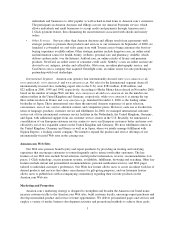Amazon.com 2000 Annual Report Download - page 21
Download and view the complete annual report
Please find page 21 of the 2000 Amazon.com annual report below. You can navigate through the pages in the report by either clicking on the pages listed below, or by using the keyword search tool below to find specific information within the annual report.sale of merchandise could result in substantial tax liabilities for past sales, decrease our ability to compete with
traditional retailers and otherwise harm our business.
Recent federal legislation limits the imposition of U.S. state and local taxes on Internet-related sales. In
1998, Congress passed the Internet Tax Freedom Act, which places a three-year moratorium on state and local
taxes on Internet access, unless such tax was already imposed prior to October 1, 1998, and on discriminatory
taxes on e-commerce. There is a possibility that Congress may not renew this legislation in 2001. If Congress
chooses not to renew this legislation, U.S. state and local governments would be free to impose new taxes on
electronically purchased goods. The imposition of taxes on goods sold over the Internet by U.S. state and local
governments would create administrative burdens for us and could decrease our future sales.
Various countries are currently evaluating their VAT positions on e-commerce transactions. It is possible
that future VAT legislation in these and other countries or changes to our business model may result in
additional VAT collection obligations and administrative burdens.
We Source a Significant Portion of Our Inventory from a Few Vendors
Although we continue to increase our direct purchasing from manufacturers, we still source a significant
amount of inventory from relatively few vendors. During 2000, approximately 27% of all inventory purchases
were made from three major vendors, of which Ingram Book Group accounts for over 10%. We do not have
long-term contracts or arrangements with most of our vendors to guarantee the availability of merchandise,
particular payment terms or the extension of credit limits. Our current vendors may stop selling merchandise to
us on acceptable terms. If that were the case, we may not be able to acquire merchandise from other suppliers
in a timely and efficient manner and on acceptable terms.
We May Be Subject to Product Liability Claims if People or Property Are Harmed by the Products We
Sell
Some of our products, such as toys, tools, hardware, wireless and kitchen products, may expose us to
product liability claims relating to personal injury, death or property damage caused by such products, and may
require us to take actions such as product recalls. Our strategic partners also may sell products that may
indirectly increase our exposure to product liability claims. Although we maintain liability insurance, we cannot
be certain that our coverage will be adequate for liabilities actually incurred or that insurance will continue to
be available to us on economically reasonable terms, or at all. In addition, some of our vendor agreements with
our suppliers do not indemnify us from product liability.
We Could Be Liable for Breaches of Security on Our Web Site and Fraudulent Activities of Users of
Our Amazon Payments Program
A fundamental requirement for e-commerce is the secure transmission of confidential information over
public networks. Although we have developed systems and processes to prevent fraudulent credit card
transactions and other security breaches, failure to mitigate such fraud or breaches may impact our financial
results.
The law relating to the liability of providers of online payment services is currently unsettled. We
guarantee payments made through Amazon Payments up to certain limits for both buyers and sellers, and we
may be unable to prevent users of Amazon Payments from fraudulently receiving goods when payment may
not be made to a seller or fraudulently collecting payments when goods may not be shipped to a buyer. Our
liability risk will increase as a larger fraction of our sellers use Amazon Payments. Any costs we incur as a
result of liability because of our guarantee of payments made through Amazon Payments or otherwise could
harm our business. In addition, the functionality of Amazon Payments depends on certain third-party vendors
delivering services. If these vendors are unable or unwilling to provide services, Amazon Payments will not be
viable (and our businesses that use Amazon Payments may not be viable).
13
























